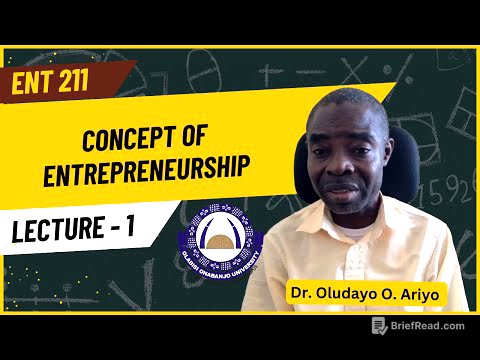TLDR;
This YouTube podcast features Mark Manson interviewing Ryan Holiday, a stoicism expert, to comprehensively discuss stoicism. The podcast covers the historical context of stoicism, its key figures like Zeno, Seneca, Epictetus, and Marcus Aurelius, the four Stoic virtues (courage, temperance, justice, and wisdom), and the influence of stoicism on modern psychology.
- Historical context and emergence of stoicism in ancient Greece.
- Key figures and their contributions to stoic philosophy.
- The four Stoic virtues and their practical application.
- Stoicism's influence on modern psychology and its relevance today.
Introduction [0:00]
Mark Manson introduces Ryan Holiday, a stoicism expert, as a guest on the podcast. The goal is to provide a comprehensive overview of stoicism, aiming to be the last resource listeners need on the topic. A PDF guide with citations and a summary of the discussion is available at solvepodcast.com/stoicism.
Setting the Scene: Ancient Greece After Alexander [2:49]
After Alexander the Great's death in 323 BC, his empire fell into disarray, leading to political chaos and a crisis of culture and meaning in Greece. The previously self-contained city-states were now controlled by foreign powers, exposing Greeks to new philosophies and ideas. This period of instability and uncertainty created a need for a philosophical framework, leading to the emergence of new schools of thought like Epicureanism and Stoicism, each offering different reactions to the turbulent world.
The Story of Zeno: Founder of Stoicism [6:44]
Zeno, a Phoenician merchant dealing in Tyrion purple dye, founded stoicism after being shipwrecked in Athens and losing everything. Introduced to philosophy through the story of Socrates, Zeno initially explored various schools like cynicism and Plato's Academy but found them unsatisfying. He established his school on the stoaple, a painted porch, emphasizing practical philosophy born from disaster. Zeno's journey involved integrating threads from different philosophies, refining them into a new approach focused on living in accordance with nature and accepting what cannot be controlled.
The Four Stoic Virtues [13:58]
The four Stoic virtues—courage, temperance (discipline), justice, and wisdom—are pivotal for understanding the universe and personal obligations. These virtues are interconnected and essential for navigating life. Courage involves moral and physical bravery, temperance is about self-discipline and moderation, justice concerns ethics and treating others well, and wisdom is the discernment to understand the world and make sound judgments.
Virtue 1: Courage [44:20]
Courage, a cardinal virtue, involves both physical and moral bravery, requiring individuals to put themselves on the line. It includes being true to oneself and acting independently, even when facing opposition. Voluntary hardship serves as a training ground for courage, preparing individuals for significant challenges. The opposite of courage isn't cowardice, but recklessness, highlighting the need for balance.
Virtue 2: Temperance (Discipline) [53:17]
Temperance, often reframed as discipline, encompasses self-control, restraint, and moderation. It involves balancing persistence and resistance, knowing when to push forward and when to hold back. Discipline isn't just about rigorous action but also about pausing, recovering, and slowing down. Mental and spiritual discipline are crucial, especially in managing emotions and reactions in today's hyper-connected world.
Virtue 3: Justice [1:05:01]
Justice, as a Stoic virtue, extends beyond legal systems to encompass ethics, integrity, and treating others with respect and empathy. Hierocles' concept of concentric circles illustrates expanding concern from oneself to family, community, and humanity. Justice counterbalances individual focus by emphasizing our interconnectedness and obligations to others, promoting honesty, service, and compassion.
Virtue 4: Wisdom [1:08:51]
Wisdom, the final Stoic virtue, involves discernment, understanding human nature, and learning from history and experience. It informs the other virtues, guiding courageous actions, balanced discipline, and just behavior. Wisdom unlocks the true meaning of Stoic indifference, enabling individuals to differentiate between what they can and cannot control, and to focus their efforts accordingly.
Roman Conquest and the Spread of Stoicism [1:25:51]
The Roman conquest of Greece led to a cultural exchange where Greek philosophy, including stoicism, influenced Roman society. Despite initial resistance, Roman elites adopted Greek ideas, integrating them into their culture and governance. This period marked a shift from theoretical debates to practical application, as Roman Stoics engaged with real-world issues of leadership and public service.
Cato the Younger: The Stoic Martyr [1:33:10]
Cato the Younger, a prominent Roman Stoic, embodied the philosophy through his actions and unwavering commitment to virtue. He staunchly opposed Julius Caesar's rise to power and defended the Roman Republic's values. Cato's suicide, rather than submitting to Caesar, became a powerful symbol of Stoic resistance against tyranny, inspiring future generations.
Seneca: The Conflicted Philosopher [1:39:06]
Seneca, a complex figure, served as an advisor to Emperor Nero, navigating morally compromising positions. Despite his wealth and influence, Seneca grappled with contradictions, attempting to balance Stoic principles with political realities. His writings, including essays and plays, explored themes of mortality, anger, and tranquility, offering insights into practical human problems. Seneca's eventual forced suicide highlighted the challenges of living a virtuous life in a corrupt world.
Epictetus: The Slave Philosopher [1:55:50]
Epictetus, a Greek slave, contrasted his lack of legal freedom with the lack of inner freedom among powerful Romans. He emphasized focusing on what one can control—one's thoughts and actions—achieving inner freedom amidst external constraints. His teachings, recorded by Arrian, influenced Marcus Aurelius and highlighted the importance of virtue over external circumstances.
Marcus Aurelius: The Philosopher Emperor [2:07:28]
Marcus Aurelius, a Roman emperor and Stoic philosopher, documented his personal reflections in "Meditations." Influenced by Epictetus, he emphasized self-improvement, virtue, and acceptance of what cannot be controlled. His practice of "the view from above" helped him maintain perspective amidst the pressures of leadership. Despite his efforts, Marcus Aurelius faced numerous challenges, including plagues and wars, and his decision to name his son Commodus as his successor had tragic consequences.
Stoicism Through History [2:20:18]
Stoicism has persisted throughout history, influencing enlightenment thinkers, founding fathers, and figures in turbulent times. Its emphasis on self-control, virtue, and resilience has resonated across cultures and eras. The philosophy's core tenets have been absorbed into various belief systems, including Christianity, and continue to offer guidance in navigating life's challenges.
Stoicism and Modern Psychology [2:20:18]
Stoicism has significantly influenced modern psychology, particularly cognitive behavioral therapy (CBT). Key concepts such as cognitive reappraisal and the dichotomy of control align with Stoic principles. Figures like Aaron Beck and Albert Ellis drew inspiration from Stoic philosophy in developing their therapeutic approaches, emphasizing the role of thoughts and interpretations in shaping emotions and behaviors.
The Modern Stoicism Revival [2:41:09]
The modern revival of stoicism reflects a need for guidance in a chaotic world. While its core tenets remain valuable, there's a risk of misinterpretation, such as "broicism," which promotes a distorted, hyper-masculine version of the philosophy. Despite these challenges, stoicism's timeless wisdom continues to offer practical tools for navigating adversity and cultivating a virtuous life.
Final Thoughts and Recommendations [2:50:06]
The essence of stoicism lies in recognizing what one can and cannot control, and choosing to respond with virtue. Ryan Holiday recommends starting with "Meditations" by Marcus Aurelius and the writings of Seneca, viewing them as companions for ongoing self-improvement. He emphasizes that stoicism is a practice, not just a theory, requiring continuous effort and reflection.
![A Comprehensive Guide to Stoicism (ft. Ryan Holiday) [SOLVED PODCAST]](https://wm-img.halpindev.com/p-briefread_c-10_b-10/urlb/aHR0cDovL2ltZy55b3V0dWJlLmNvbS92aS9IdkVnMzdCNERVNC9tYXhyZXNkZWZhdWx0LmpwZw==.jpg)








